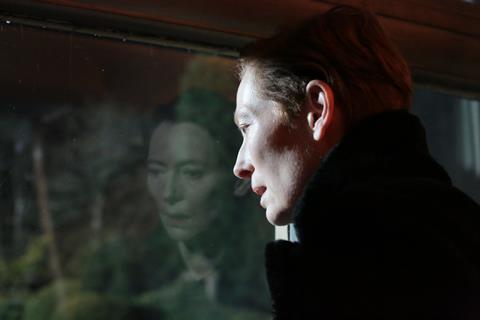Joanna Hogg and Tilda Swinton reteam for another resonant, personal work

Dir/scr/prod. Joanna Hogg. UK. 2022. 99mins.
There’s certainly a ghost in Joanna Hogg’s hermetic haze, but who is haunted, and by what, preoccupies the piece. Right from the first plaintive flute notes, to the dusk-dawn drives into and out of the crenellated folly of a hotel in Wales which will house film-maker Julie (Tilda Swinton) and her mother Rosalind (also played by Swinton) for a birthday celebration-cum-getaway, Hogg is saluting the heritage of her eerie film, wisps of English country house horror sliding under the door with the never-ending November fog.
The more overtly personal Hogg is as a writer/director, the more resonant her work becomes
Executive produced by Martin Scorsese and backed by Ireland’s Element after their support of The Souvenir diptych, The Eternal Daughter is competing at Venice, marking Hogg’s long-delayed acknowledgment at the top levels of the global art-house; albeit with her most modest, intimate piece. Shot during lockdown, it barely boasts a cast of four as Hogg churns her life over for the screen, continuing to meld herself with Swinton and her family — their collaboration began when Swinton starred in Hogg’s graduation short and Swinton’s daughter Honor went on to play Julie in The Souvenirs (2019, 2021)
Julie and Rosalind, never seen together in a two-shot or even in a reflection – and there are many here – travel in a white cab as night falls to a Georgian country house in Wales now operating as a hotel (Hogg filmed in Soughton Hall during the pandemic). Rosalind is recognisable from The Souvenir, where she was played by Swinton, and you can see in Swinton’s Julie the middle-aged version of the over-sensitive character the actor’s daughter Honor created with Hogg.
The taxi driver tells a story about a ghostly face in a window as they travel, but Rosalind is asleep. As Julie frets and fusses over her mother, and her mother’s dog Louis (an inveterate scene-stealing spaniel), the house grumbles and moans under the care of a single grumpy receptionist (Carly-Sophia Davis) and a night porter (Joseph Mydell). Bartok’s strings soar as gargoyles look down on a family graveyard. There’s even a formal garden wrapped around a fountain, as Hogg moves ever closer to Jack Clayton’s The Innocents (1961, an adaptation of Henry James’ ‘The Turn Of The Screw’.)
A face appears in a window in the fog. A bell strikes as if Symphonie Fantastique was going to break out a Shining. Not a chance. Genre fans will be disappointed, but Hogg is using these trappings to examine the mother/daughter bond, so evident in The Souvenir Part 2 in particular. They’re as posh as ever, these two, with their crisp requests to the staff to expedite matters, their dog-on-the-bed, fussy half-sentences and apologies, and things eternally left politely unsaid. The menu boasts Welsh feta. ‘So nice when it’s local,’ remarks Rosalind. But love is love whatever class it comes in – and so are regrets, losses, missed opportunities.
The more overtly personal Hogg is as a writer/director, the more resonant her work becomes. With The Souvenir, which told the story of Julie/Hogg’s faltering start in the film business, she began to pick at the fabric which separated her from her characters in early works like Archipelago or Unrelated, and it seems to have released her. It’s a thin gauze here too, and The Eternal Daughter is at its most poignant when it plunges into the personal – in Swinton’s retreating mother and faltering daughter, you can sense the director’s power growing as she continues to acknowledge herself. You can certainly say this is, at least in part, an insider piece, albeit one with a readily built-in audience and encased in a delicious film heritage wrapper. The twist is too heavily-signalled to deliver anything past emotional release for its characters: if the audience is onboard, they’ll get that too.
Hogg’s team behind the camera continues to be empathetic to her work. Stephane Collonge’s production design impresses again, here creating a subtle difference to what’s inside the frames of Julie and Rosalind, even when they share the same space. The touches are so small, yet they give the feeling of broken-ness. Editor Helen le Fevre also returns, with Grace Snell on costumes. Cinematographer Ed Rutherford is back after an absence, relishing the opportunity to create a classic haunted house for Hogg.
It’s Swinton, though, whose face, or faces, linger. She has explored duality before – she shot to fame in Orlando, after all. Just because she can do it, though, doesn’t make her performances any less remarkable. It’s a personal work for both her and Hogg together, one which is public, working through private grief that is universal — and, as the title suggests, eternal.
Production companies: Element Pictures
International sales: A24, intl@a24films.com
Producers: Joanna Hogg, Emma Norton, Ed Guiney, Andrew Lowe
Screenplay: Joanna Hogg
Cinematography: Ed Rutherford
Production design: Stephane Collonge
Editing: Helle le Fevre
Main cast: Tilda Swinton, Joseph Mydell, Carly-Sophia Davis























